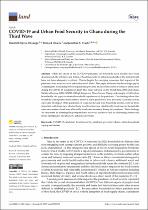| dc.contributor.author | Onyango, Elizabeth Opiyo | |
| dc.contributor.author | Owusu, Bernard | |
| dc.contributor.author | Crush, Jonathan S. | |
| dc.date.accessioned | 2023-03-15T07:24:46Z | |
| dc.date.available | 2023-03-15T07:24:46Z | |
| dc.date.issued | 2023 | |
| dc.identifier.citation | Onyango, E. O. et al. (2023). Covid-19 and urban food security in Ghana during the third wave. Land, 12(2), 504. https://doi.org/10.3390/land12020504 | en_US |
| dc.identifier.issn | 2073-445X | |
| dc.identifier.uri | https://doi.org/10.3390/land12020504 | |
| dc.identifier.uri | http://hdl.handle.net/10566/8582 | |
| dc.description.abstract | While the effects of the COVID-19 pandemic on household food security have been
documented, the intensity and forms of food insecurity in urban households in the Global South
have not been adequately explored. This is despite the emerging consensus that impacts of the
pandemic were more severe in urban than rural Africa. This paper addresses this knowledge gap by
examining the relationship between pandemic precarity and food insecurity in Ghana’s urban areas
during the COVID-19 pandemic in 2020. This study is based on the World Bank (WB) and Ghana
Statistical Service (GSS) COVID-19 High-Frequency Phone Survey. Using a sub-sample of 1423 urban
households, the paper evaluates household experiences of the pandemic. Our findings show that
household demographic characteristics are not a major predictor of food insecurity. Economic factors,
especially the impact of the pandemic on wage income and total household income, were far more
important, with those most affected being most food insecure. | en_US |
| dc.language.iso | en | en_US |
| dc.publisher | MDPI | en_US |
| dc.subject | Covid-19 | en_US |
| dc.subject | Public health | en_US |
| dc.subject | Food security | en_US |
| dc.subject | Ghana | en_US |
| dc.subject | Unemployment | en_US |
| dc.title | Covid-19 and urban food security in Ghana during the third wave | en_US |
| dc.type | Article | en_US |

